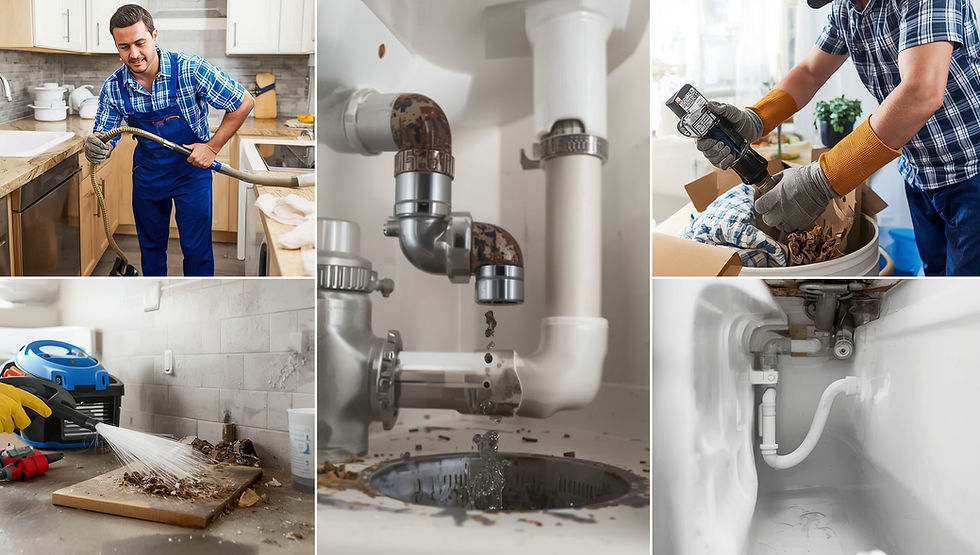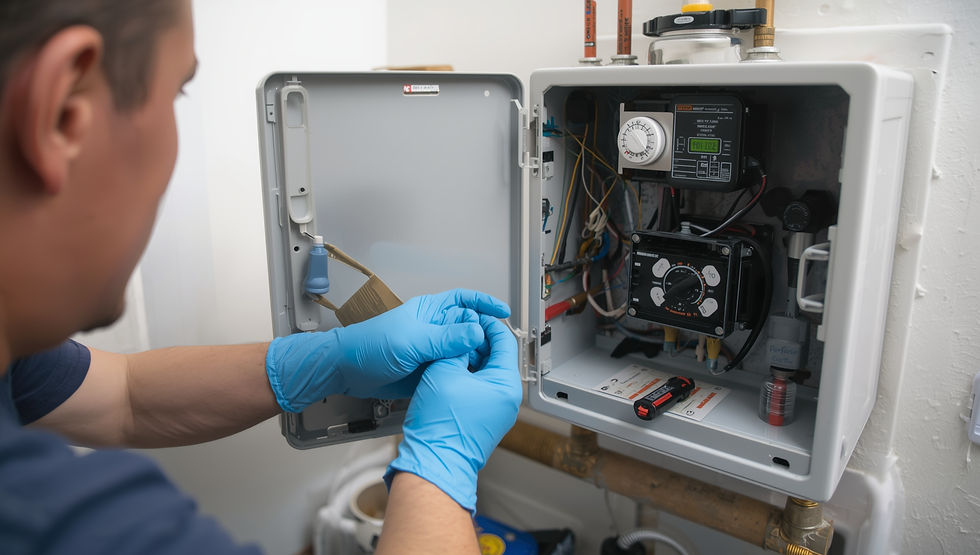Why is my water heater not heating properly?
- bradleyserranomark
- Sep 2, 2025
- 4 min read
Why Is My Water Heater Not Heating Properly?
Few household issues are as frustrating as turning on the tap for a hot shower—only to be greeted by lukewarm or cold water. Your water heater is one of the hardest-working appliances in your home, and when it fails to do its job, daily routines are disrupted.
But what causes a water heater to stop heating properly? Is it a quick DIY fix, or do you need to call a professional plumber?
In this guide, we’ll break down the most common reasons why your water heater may not be heating properly, how to troubleshoot them, and what solutions work best.

Understanding How Water Heaters Work
Before diving into problems, it’s important to understand the basics.
Traditional Tank Water Heater: Stores 30–80 gallons of water, heating it continuously.
Tankless Water Heater: Heats water on demand as it passes through coils, with no storage tank.
If your system isn’t heating, the problem could stem from power supply, fuel source, heating elements, thermostat settings, or internal parts.
Common Reasons a Water Heater Isn’t Heating
1. Thermostat Issues
The thermostat controls water temperature. If it’s set too low, water won’t be hot enough. If faulty, it may fail to regulate heating.
Solution: Check the thermostat setting (typically 120°F is recommended). If adjusting doesn’t help, it may need replacement.
2. Heating Element Failure (Electric Models)
In electric heaters, heating elements warm the water. If one burns out, you’ll notice lukewarm water.
Solution: A plumber can test and replace faulty elements.
3. Pilot Light Problems (Gas Models)
If the pilot light goes out, your heater won’t ignite. This is one of the most common gas heater issues.
Solution: Relight the pilot following manufacturer instructions. If it won’t stay lit, the thermocouple may need replacement.
4. Sediment Buildup
Minerals in water settle at the bottom of the tank, creating a barrier between heating elements and water. This reduces efficiency and heating capacity.
Solution: Flush your water heater annually to prevent sediment buildup.
5. Faulty Thermocouple or Gas Control Valve (Gas Heaters)
A broken thermocouple prevents gas flow to the burner, leaving the water unheated.
Solution: Replace faulty parts with the help of a plumber.
6. Tripped Breaker or Power Supply Issues
Electric heaters need a steady power source. If the breaker trips, the heater shuts off.
Solution: Check your breaker box. Reset if needed. If the breaker continues tripping, call an electrician or plumber.
7. Leaking Tank
If hot water is escaping through a leak, your system won’t heat properly.
Solution: Small leaks may be repaired, but often a leaking tank means replacement.
8. Incorrectly Sized Water Heater
If your household demand exceeds the heater’s capacity, you’ll constantly run out of hot water.
Solution: Upgrade to a larger tank or consider a tankless system.
9. Blocked or Dirty Burner (Gas Models)
Dust, dirt, or corrosion can clog the burner, preventing efficient heating.
Solution: Have the burner cleaned by a professional.
10. Dip Tube Problems
The dip tube delivers cold water to the bottom of the tank. If broken, cold water mixes with hot, leading to lukewarm water.
Solution: Replace the dip tube.
Troubleshooting Checklist
If your water heater isn’t heating properly, follow these steps before calling a professional:
Check thermostat settings – ensure it’s around 120°F.
Inspect the power source – breaker box for electric, gas supply and pilot light for gas.
Listen for unusual noises – popping or rumbling may indicate sediment buildup.
Look for leaks – inspect around the tank.
Test water at multiple faucets – problem may be plumbing-related, not the heater itself.
DIY Fixes vs. Professional Help
Safe DIY Fixes:
Adjust thermostat.
Reset breaker.
Relight pilot light.
Flush sediment buildup.
Call a Professional If:
Heating elements or thermocouple need replacement.
Tank is leaking.
Gas control valve is faulty.
You’ve tried basic troubleshooting without success.
Preventive Maintenance Tips
Keeping your water heater in good shape prevents heating problems down the road:
Flush tank yearly to remove sediment.
Test pressure relief valve to ensure safe operation.
Insulate tank and pipes to reduce heat loss.
Check anode rod every 2–3 years (protects against tank corrosion).
Schedule annual inspections with a licensed plumber.
Signs It’s Time to Replace Your Water Heater
Even with repairs, some heaters simply wear out. Replacement may be the smarter choice if:
Unit is over 10–15 years old.
Repairs are becoming frequent and costly.
You notice rusty water or loud banging sounds.
Efficiency has dropped significantly.
The tank is leaking.
In many cases, upgrading to a tankless system or a high-efficiency tank model can improve performance and lower energy bills.
Frequently Asked Questions
Q: Why is my water heater not heating enough water?A: Likely thermostat issues, heating element failure, or sediment buildup.
Q: Can hard water affect my water heater?A: Yes, hard water accelerates sediment buildup, reducing heating efficiency.
Q: How long should a water heater last?A: Traditional tank models last 8–12 years, while tankless units can last 15–20 years.
Q: Should I repair or replace my water heater?A: If repairs are frequent or the unit is older than 10 years, replacement is often more cost-effective.
Conclusion
A water heater that isn’t heating properly can be caused by something as simple as a thermostat setting—or as serious as a leaking tank. The key is understanding symptoms, troubleshooting steps, and knowing when to call a professional.
Minor issues like sediment buildup, tripped breakers, or thermostat adjustments are manageable at home.
Major issues like failing elements, leaks, or gas system malfunctions should be left to professionals.
By investing in regular maintenance and timely repairs, you’ll extend the life of your water heater, save on energy costs, and ensure your family enjoys reliable hot water.



Comments